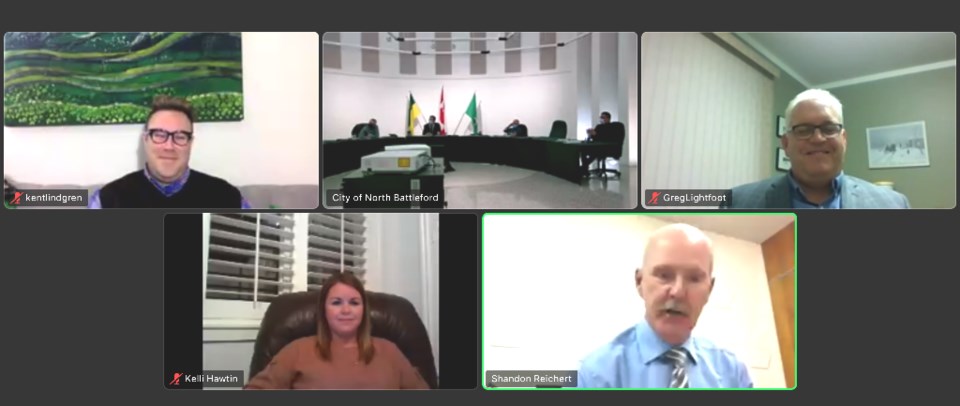The Battlefords North Stars are getting a break on rental rates at the Civic Centre due to the COVID-19 pandemic.
Team president and governor Shandon Reichert went before city council Monday to make that request for a break on rental rates, given the financial issues facing the North Stars due to COVID-19 restrictions on spectators at the Civic Centre.
The club normally draws between 800 and 1,000 fans a game but current provincial guidelines have reduced spectator capacity to 150 people in all SJHL arenas, drastically impacting gate revenues for all the teams.
The North Stars club is being granted a temporary reduction of their per game rental rate at the Civic Centre to the same rate imposed on the under-18 AAA Battlefords Stars, who also play at the Civic Centre. Under their current agreement that runs until July 31, 2022, the North Stars pay $1,166 per game plus an annual CPl adjustment, and they also pay $188 per game plus annual CPI adjustment for rental of the upper auditorium “hot stove lounge” on Fridays-Sundays and also during the playoffs.
The proposal approved Monday called for their rental rate to be reduced to $600 per game night, the same rate as for the U18 AAA club. That amount includes the hot stove lounge.
Council has approved the North Stars request but the break on rent will be done in the form of a grant to the club to make up the difference.
Also, the intention is for the reduced rate to stay in effect until Saskatchewan Health Authority changes its restrictions on spectator levels, upward or downward, at which point it can be revisited by the city. The club has hopes that the allowed capacity could be increased to 25 percent or even 50 percent by the end of the season.
In correspondence to the city dated Nov. 18, the North Stars outlined the situation facing the club during the pandemic.
“The Battlefords North Stars have been a part of this community since 1973 and this season has been by far the most difficult. With our spectator maximum being 150 as per Sask Health and Sask Hockey, financially, we impacted drastically. We are not able to accommodate our 254 season pass holders and therefore are selling tickets on a per game basis. We are moving to a pay to play scenario to cover billet costs, however, we still face losing the club to the financial and social impacts of COVID. Next season is in jeopardy if we cannot remain in operation this season.”
Their correspondence also acknowledged the precarious state of the current season due to COVID-19. “Each game could be our last and at this moment, we are planning week to week.”
In speaking to council Monday, Reichert noted their main issue is on the revenue side. He noted their average game day revenue runs from $4,000 to $5,000 per game, but with the first two exhibition games they “didn’t quite get to $2,000.”
That game day revenue also included the bar and the 50/50, he said. Corporate sponsors have stuck with the club, but the overall hit to revenue was estimated to be down 25 per cent.
Reichert also said the club has taken advantage of the federal government’s wage subsidy, and have also accessed the $40,000 Canada Emergency Business Account to provide cash flow to the club after their league playoffs were stopped.
When asked by Councillor Kelli Hawtin about the club’s ability to get through 2020-21 with 150 spectators, Reichert said it looked like the club could get through this season.
“Our board’s big concern is next year,” Reichert said. He did note they had good support from corporate sponsors as well as season ticket holders. But if COVID-19 drags on and the economy is hurt, Reichert expressed concern corporate sponsorship could be cut in half.
“It’s not that they don’t want to, it’s that they may not have the ability to sponsor us,” said Reichert.
There was widespread approval at council for doing something to help the North Stars.
Not only did they bring economic value to the community, said Hawtin, but “we have community ambassadors all over North America, which is invaluable as far as I’m concerned.”
New councillor Bill Ironstand described himself as a proud North Stars alumni and noted the team had attracted players to the community.
“They are our team,” said Ironstand, who said he fully supported the request.
The motion to support the North Stars’ request carried unanimously.



